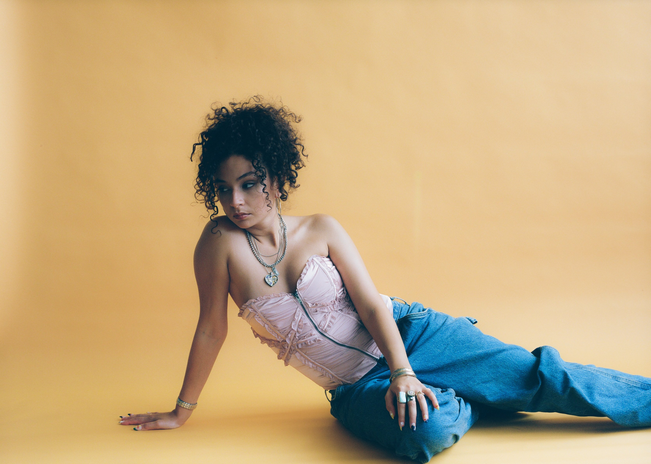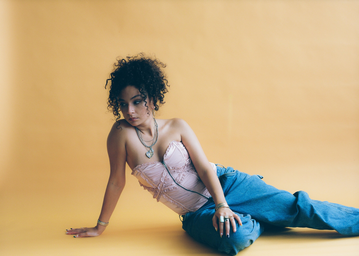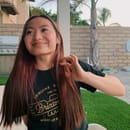Marcela Avelina does it all. Not only does she play Flora in Netflix’s “Grand Army” and actively participate in the music scene, but she is an extremely genuine person who believes in building across rather than up. Her Campus at UCLA had the chance to have a conversation with Marcela about her career and new single “Took Me Out,” along with the collaborative role she plays within Beachball Records.

Marcela: I was born in New York City and raised there. I don’t know if there was necessarily a specific pivotal moment where I was like, “This is what I wanna do.” I don’t really remember ever wanting to do other things. I just always kind of knew that was my lane. Obviously as you get older, you start to take it more seriously, and it takes on different forms. But, I was always a singer, and I luckily have a family that was encouraging of that, so they actually enrolled me in some acting classes when I was younger. That’s how I got started with that, and I just stuck with it from there. And then I ended up going to a performing arts middle school and high school.
HC: So you play Flora in the show “Grand Army” and were also on the original cast of “Slut,” which is the play the show is based on. What made you decide to also take part in the television version of this project, and how was it different?
M: I was honored to even get an audition for it. I felt grateful to even have that much, so even to be in it is just a huge blessing. It’s different because in “Grand Army,” we see the world of “Slut” expanded, so we see characters from the play come to life that you don’t necessarily see physically onstage, which is really amazing. And then on top of that, there are a bunch of different students that are added to the equation. It’s just really cool to see it all come together from having known it as one thing.
HC: I think Flora is such a badass. And she cares so much about Sid and always wants to be there for him and Meera. What is your favorite thing about Flora? And what is your favorite part about playing her?
M: My favorite thing about Flora is how vulnerable she is. She’s an advocate for herself, even through caring about Sid. It’s not like she isn’t also an active part in this relationship. I feel like a lot of the times when we see relationships in general depicted with women and Latina women, they’re just kind of cheerleaders for the guy, and that’s just not the case here. Flora actively wants answers for herself too, which I think is amazing, and I like that she’s vulnerable and parsing through those questions and trying to get her answers because that’s the reality.
HC: How does the show reflect your high school experience in New York?
M: I feel like it was super close to home. First of all, the representation in the show is monumental in my opinion. I feel like it accurately depicts what a New York City public high school does look like and feel like. I relate to Flora a lot. My experience wasn’t identical to hers, but I did have sort of a similar experience with my first relationship in high school. All to say that he’s one of my best friends to this day, but at the time, when I was going through my end of that, there was no show depicting this kind of nuanced relationship. So it was really refreshing to be able to play a character that I feel like I would have loved to see when I was younger. I think that Sid and Flora have a beautiful relationship, and there is such a strong love there. I think that love takes on a bunch of different forms, and it can look a lot of different ways.
HC: What do you hope audiences take away from the show?
M: I really hope that audiences realize that issues of sexual violence, racism, and self-identity crises are not exclusive to adults. I think that the further adults get away from adolescence, they tend to undermine or forget that as a young person, you are three-dimensional, and you’re existing on the same planet as everybody else older than you. So I think we need to be attentive and honorable to young people so that they feel like there are spaces for them to be honest, to thrive, to be heard, and to be accepted.
HC: What was the energy like on set?
M: Really warm. Really, really, really warm. This cast is one of the most brilliant groups of people I’ve ever been around. And in addition to that, the crew and all of the directors were so caring and tender with all of us, given that the material can be pretty heavy. And Katie Cappiello, the showrunner, was amazing. It was really loving. There was a lot of support.

M: I struggle with this, actually. I would say it’s R&B overall, but I think that it’s a lot of different genres. I don’t necessarily feel like it’s exclusive to one, but I would say that my music is really honest and vulnerable. It’s probably the most blunt I am.
HC: You have a new single called “Took Me Out.” What does this song mean to you and what’s different about it from your other songs?
M: “Took Me Out” is actually really special for me because it really is a different route than the other singles that I have out, and in general, the songs that I’ve worked on in the past. It’s definitely reflective of a different approach that I have with this album that I’m working on. I’ve been playing with a band for five years, and I feel like being able to layer electronic sounds but still maintaining the live instrumentation and finding a balance that I like has been really exciting. I also feel like “Took Me Out” just has a more upbeat feel to it that is not usually the direction that I’ve gone in.
HC: What does your songwriting and producing process look like and how long does it usually take?
M: It really depends. I have so many songs in the book that I’ve just been holding onto for forever. But prior to recording, I usually either write a song on piano or guitar. I always write the melody, vocal line, and lyrics at the same time. It’s always me with my guitar and my piano, and then I usually bring it to my band and then we expand on it. I tend to note what I want, and they’re brilliant musicians, and they always have amazing ideas that they contribute. Then we take it to the studio, and we’re all pretty involved in the producing process. I have this artist collective that I’m a cofounder of, called Beachball Records.
HC: Could you tell me a little more about Beachball Records and how it got started?
M: It’s been going on for years, but I think now we just have a name for it. My friend Stella, Mike Dvorscak, and I are founders of it, and Mike is actually a co-producer on “Took Me Out.” Essentially, it’s all of us pulling our resources together, my band included. I think there’s this weird mentality of stinginess in music that I don’t think is productive or necessary at all. I really believe in building across rather than up. And our focus is making resources accessible to people that maybe didn’t attend institutions or conservatory and don’t have immediate access to musicians or a studio. It’s also providing that safe space. Especially since the DIY music scene, as I’m sure you know, caters to white boys.
HC: Yeah, it actually is hard to find the resources.
M: Yeah, and nobody wants to share that, and nobody wants to tell you how to write that first email to book your first show. But, we’ll happily share that with you. That doesn’t take away from us getting booked.
HC: Do you have a website or socials?
M: We have an Instagram up, @beachballrecords, which everyone should definitely follow, and we’re building the website right now. There will be a ton of information on that website on how you can get involved and the resources that we can provide. And also doing it reasonably, but at a budget. Because people think that high budget equates to quality, but that’s not true. It’s a matter of getting played, and people take advantage, but also still honoring that artists do deserve to get compensated. It’s complicated, so we want to help people parse through that and also continue to hone in on the circle that we’ve built that’s been working really well for a long time.

M: I want them to feel like they’re being told the truth. There’s only so much control.
HC: And since you’re in a show about high school, if you could give your high school self one piece of advice, what would it be?
M: I would say trust the long game. Trust the long games when it comes to art, and always remember that if things are born in your brain, you have full agency over how you execute those visions and ideas.
HC: Is there anything else you would like to add?
M: I’m working on an album right now…
HC: Do you have any idea when that will be released?
M: In early 2021. And “Took Me Out” is a single off of that album, so I’ll definitely have a lot more coming along the way and also along with Beachball Records.
It was so fun getting to interview Marcela, and we really appreciate her honesty about self-advocacy as well as providing resources to those that may not have immediate access to them. She is able to make her visions a reality through authenticity and vulnerability while also lifting up those around her, and that’s something we can all learn from.



